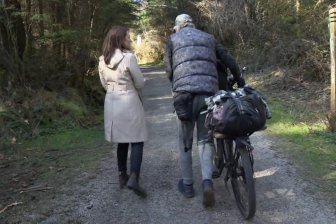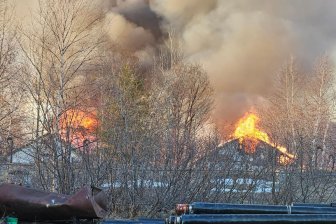Anti-pipeline protests across Canada this week have prompted questions of how exactly Indigenous governance works, namely what the differences are between non-elected hereditary chiefs and band councils elected by First Nations.

The protests began after 14 people were arrested Monday on the traditional territory of the Wet’suwet’en First Nation.
READ MORE: Why did RCMP arrest 14 people at Wet’suwet’en Camp, and what happens next?
Coastal GasLink wants to build a natural gas pipeline through the territory, and says it has signed agreements with the elected councils of all 20 First Nations along the path — including the Wet’suwet’en.
However, there’s a disagreement within the Wet’suwet’en First Nation, where elected council supports the pipeline project and hereditary chiefs oppose it.
WATCH: Trudeau visits B.C. amid angry pipeline protests

The Unist’ot’en, a house group within the five Wet’suwet’en clans, set up a pipeline protest camp near Houston, B.C., almost a decade ago. The arrests Monday were at a checkpoint set up by the Gidimt’en, who are another of the five clans.
While protesters said they could abide by the injunction late Wednesday night, they maintained their disapproval of the project.
A look at hereditary chiefs:
University of Toronto professor Jeffrey Ansloos, who is a member of the Fisher River Cree Nation, explained to Global News that hereditary chiefs are a form of Indigenous governance that precede British colonization.
“These are, in a very real sense, governments with distinct law, with distinct traditions, rule, regulations and protocols for how communities are governed,” Ansloos explained.
READ MORE: Rallies held in support of anti-pipeline protesters arrested in northern B.C.
A look at band councils:
Band councils, in contrast, are a structure that was introduced by the federal government through the Indian Act.
He noted that how these two groups work together can vary among First Nations communities.
“What you see in the case of what’s happening currently in B.C. is a tension between the interests of a band council and individuals in the community that are recognized within the community — not necessarily outside of the community — as community leaders.”
WATCH: Prime Minister greeted by protesters in Kamloops

Who should companies and government be negotiating with?
Val Napoleon, director of the Indigenous law research unit at the University of Victoria, explained that governments and companies negotiating with First Nations on everything from treaties to resource development must find ways to include and accept differing Indigenous governance and legal structures as part of their agreements.
But the issue can be tricky.
READ MORE: ‘No easy answers’ — Indigenous rights and pipelines dominate Trudeau’s B.C. trip
“The question of who represents Indigenous people is a thorny one,” Napoleon said. “Just saying this system is good and that system is not isn’t helpful. Indigenous legal traditions have to be part of the relationship with Canada.”
B.C. Premier John Horgan has said there is no set formula for negotiating agreements with Indigenous groups in B.C., where there are roughly two dozen treaties among more than 200 First Nations.
“It’s the responsibilities of the two orders of government to figure that out,” he said. “We do that by working in consultations with band councils and hereditary leadership. I would love to be able to say to you it’s really simple, but it’s not.”
WATCH: Premier John Horgan on the challenges of building a pipeline up north

Ansloos noted that it’s important to remember that the territory in question is unceded — no Wet’suwet’en land has been surrendered to the government by treaty.
“I think this is a reminder that, first and foremost, that not all the land within sort of broadly understood borders of Canada is held by the government of Canada,” he said.
What Trudeau has said
Prime Minister Justin Trudeau said Thursday that he was pleased to see tensions between police and First Nations eased slightly following the arrests.
Trudeau, speaking at Thompson Rivers University, said the tensions prove the government needs to properly engage with Indigenous peoples and build a different relationship than it has in the past.
WATCH: Trudeau pleased with de-escalation after RCMP arrests in northern B.C. blockade

“I think we can all agree that is the way we need to move forward as a country, in a more respectful, more thoughtful, more engaged way. There are going to be moments when that doesn’t work out as well as it should and we’ll need to learn from those moments,” he said.
The prime minister has not clearly said what possible solutions to the disagreements could be.
What’s next?
Ansloos noted that one of Trudeau’s main campaign promises included reconciliation efforts with Indigenous peoples, and especially in an election year, this issue doesn’t bode well.
The professor predicted that the issue will end up in the legal system, where First Nations and advocates will press the government to abide by the United Nations Declaration on the Rights of Indigenous Peoples.
“That certainly by all reports is in violation at this moment,” Ansloos said.
— With files from The Canadian Press




Comments